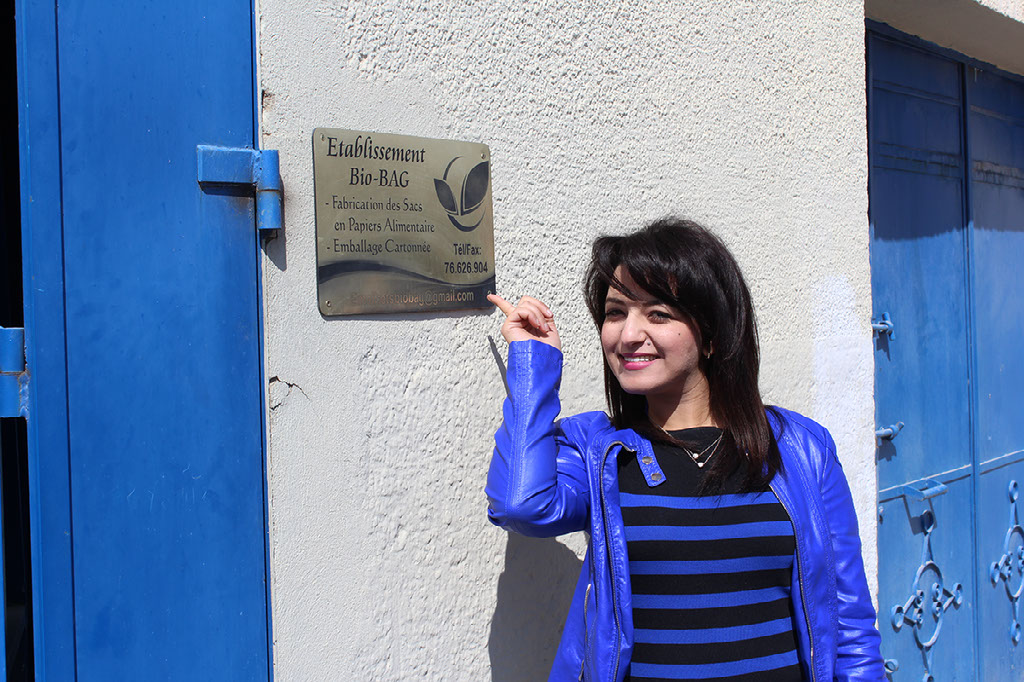Entrepreneurs prove environmental protection and economic success go hand-in-hand
08 July 2019 UNIDO

中文版
Protecting the environment is a global priority and is as urgent in Tunisia as it is anywhere else in the world. Economic growth has at times been detrimental to the fragile natural environment and there is a rising call for a new mindset to help mitigate climate change.
In 2014, Tunisia became one in a handful of nations to enshrine its commitment to climate stewardship in its constitution, recognizing the necessity of preserving the environment and protecting natural resources for future generations. Its Article 45 also obligates the state to “provide the necessary means to eradicate environmental pollution”. And while the government has paved the way for action, Tunisian businesses play a significant role in realizing the transformation to a greener economy.
Investing in clean energy
To expand the country’s renewable energy capacity, the Tunisian government is investing heavily in the sector. The country aims to increase the share of renewable energy in electricity consumption from the current 3 to 30% by 2030. Many farmers have already received subsidies to power their wells and irrigation systems with solar energy. The state-run energy agency also offers discounts for homes that heat water with solar panels. But what about entrepreneurs in this field?
Forward-thinking entrepreneurs like Nizar Thlijani from Kairouan are proving that cleaner energy is a sound investment. In 2018, the Mashrou3i project provided Nizar with a 10 days of technical training on the maintenance of hydraulic pumps and the installation of photovoltaic panels for rural irrigation. The 33-year-old entrepreneur also took part in a HP LIFE workshop to strengthen his business and IT skills. Since then, Nizar has gained several clients, promoting clean energy use in the region’s agricultural sector.
When the Tunisian government introduced a ban on the sale of plastic bags, Nouha Issaoui saw an opportunity to launch a business that produces a sustainable alternative. With Mashrou3i support and training she launched Bio Bag, a firm producing paper bags in Sidi Bouzid with an investment of 250,000 Tunisian Dinars. Actively promoting ecological practices in Tunisia, the young entrepreneur is also about to start exporting her products to other African countries and Europe.
Supporting local development
A huge amount of plastic doesn’t get recycled. It ends up in landfill or littering our oceans, leading to the release of harmful toxins into the environment. Mohamed Fadhel identified an eco-friendly business idea to help solve this challenge. Launched in 2018, Plastic Recovery, specializes in the collection and recycling of household and industrial plastic waste. Once the plastic is sorted and cleaned it is transformed into plastic granules that are then sold to plastic injection companies for reuse.
Plastic Recovery also shows that green businesses can and do benefit local communities. The firm is not only successfully generating a profit. It’s also creating jobs and stimulating Sidi Bouzid’s social and solidarity economy.
In addition to support from Mashrou3i’s regional expert, Mohamed received several trainings to improve his sales, communication skills and empower him to assess and enhance the environmental impact of his business activities.
Green business can also be low-tech
Green solutions are not all about photovoltaic panels and biofuels. Inspired by her passion for decoration and textiles, 28-year-old Olfa Romdhani launched a business that encourages people to breathe new life into their furniture, rather than simply throwing it away.
Combining traditional tapestry techniques with modern designs, Alpha Déco offers customers the possibility to upcycle their belongings. By prolonging the life cycle of objects and avoiding waste, the business ultimately challenges our throw-away society. Olfa is one of many entrepreneurs who received support from Mashrou3i as she started the journey of entrepreneurship.
A new wave of green MSMEs
Green businesses, are by and large micro, small and medium sized enterprises (MSMEs) - whether a renewable energy company, recycling firm or locally sourced handicraft business. And even if these MSMEs do not have a green mission at their core, they are deeply rooted in the needs of their community and local environment, and therefore often have an incentive to be good environmental stewards.
Mashrou3i is fostering a new cadre of green entrepreneurs through the HP LIFE e-learning programme, deep dive business coaching and technical assistance. In the last two years, the private-public partnership between the Tunisian government, USAID, the Italian Cooperation, the HP Foundation and UNIDO has provided intensive training to over 104 people in environmental techniques to improve their waste management and enhance their environmental awareness.